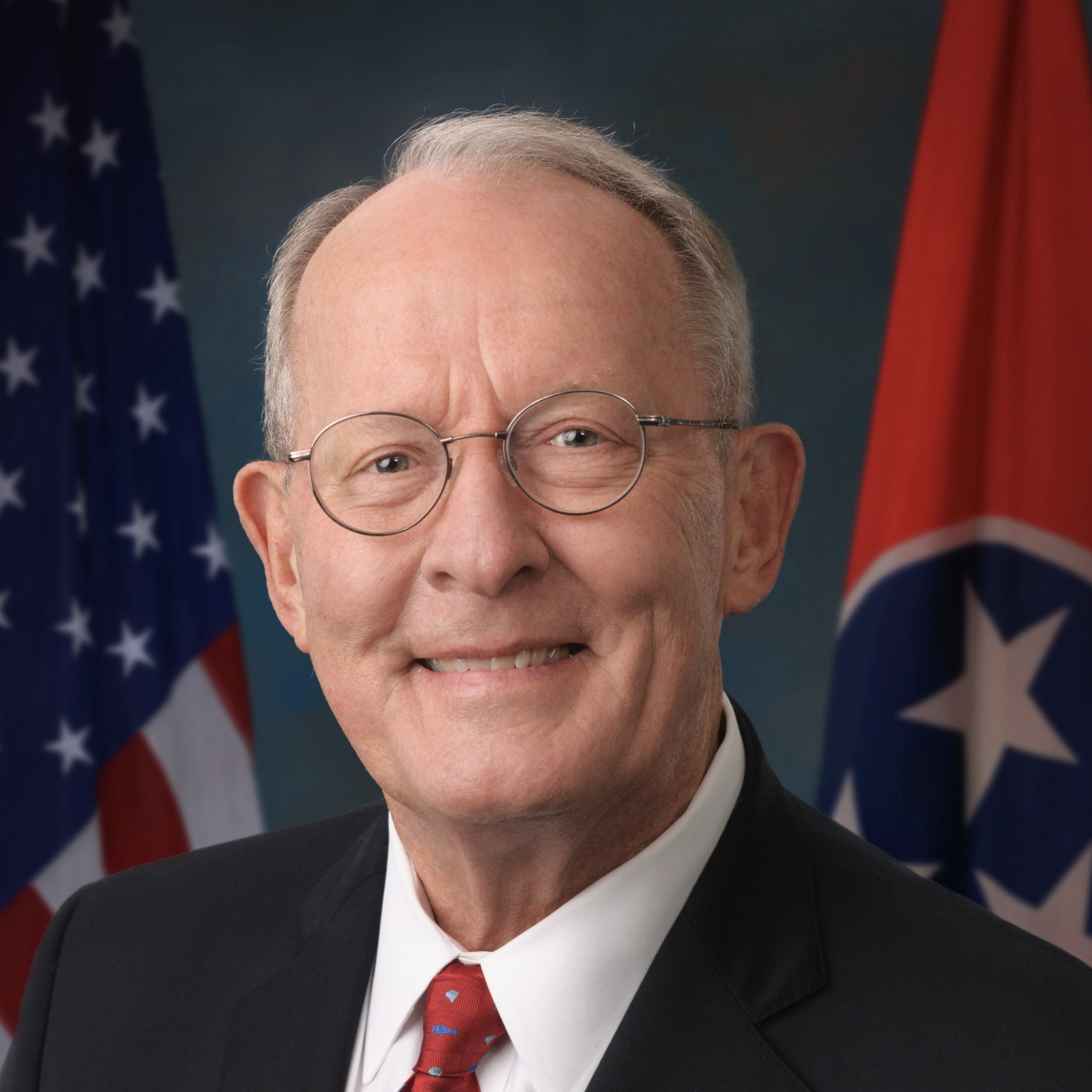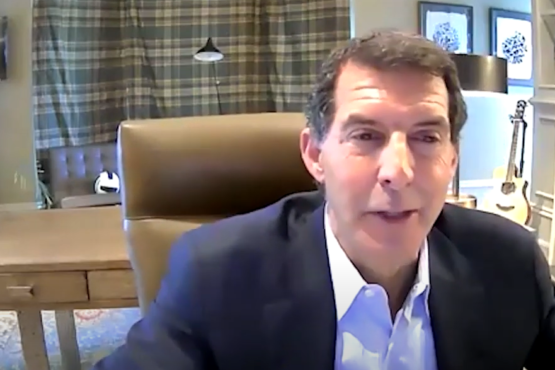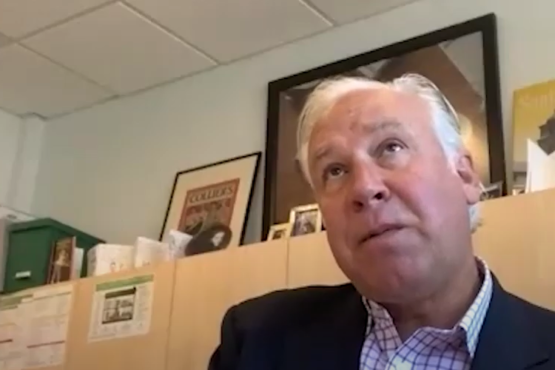Senator Lamar Alexander is a two term governor of Tennessee, a former US Secretary of Education under George H. W. Bush and today chairs the Health, Education, Labor and Pensions Committee. This is the Senate committee that has jurisdiction over the majority of federal health policy. Lamar is an enigma in today’s political climate, achieving major bipartisan legislative victories like the 21st Century Cures Act and the Every Student Succeeds Act while Washington is gridlocked by partisanship. He’s one of the most powerful people in healthcare today and also one of the most respected, pragmatic and productive members of Congress. In our conversations, Senator Alexander shares how he’s navigated congress as an effective lawmaker and what’s next on the health policy agenda.
Bill Frist: Welcome to A Second Opinion Podcast where we are rethinking American health. I’m your host Senator Bill Frist. To make sense of all the dynamic perspectives in healthcare, you need a trusted source engaging at the intersection of policy, medicine and innovation. You need A Second Opinion, a podcast where it all comes together. For our second episode, we’re lucky to have United States senator Lamar Alexander joining us. But before we get started, I want to thank our sponsors. A Second Opinion is powered by Tivity Health, lifestyle brands that transform healthy living for adults through nutrition, fitness, and social connection. We’re also brought to you by the Blue Cross Blue Shield Association, in every community and every state, Blue Cross and Blue Shield is solving America’s healthcare challenges, breaking down barriers, preventing disease, opening doors to care for the health of America.
Bill Frist: Now let’s turn to the episode. Senator Lamar Alexander is a two term governor of Tennessee, a former US Secretary of Education under George H. W. Bush and today chairs the Health, Education, Labor and Pensions Committee. This is the Senate committee that has jurisdiction over the majority of federal health policy. Lamar is an enigma in today’s political climate, achieving major bipartisan legislative victories like the 21st Century Cures Act and the Every Student Succeeds Act while Washington is gridlocked by partisanship. He’s one of the most powerful people in healthcare today and also one of the most respected, pragmatic and productive members of Congress.
Bill Frist: In our conversations, Senator Alexander shares how he’s navigated congress as an effective lawmaker and what’s next on the health policy agenda. Now please join me and our guest for A Second Opinion. Lamar, thanks so much for being with us today and it’s a real honor and a real privilege to continue a conversation that we’ve had many, many times in the past and that is how to improve the health and wellbeing and the healthcare for everybody in our communities in Tennessee and around the country. You’re in a position to both continue to deliver on it, but as we look to the future to do many, many things. So thanks for being with us.
Lamar Alexander: Thank you, Bill.
Bill Frist: You know what we might do is talk a little bit about your experience as chairman of the heath committee. You’ve done so much and we’ll talk about health because some of our viewers don’t know what that is, but it’s the committee, one of the two committees in charge in the United States Senate for health, and you can explain that. But you’ve done remarkable, remarkable job in the last really three years in moving the ball not just an incremental way, but in a way that a lot of people don’t know and aren’t aware of, which is the best kind of progress to make. But tell us a little bit about the committee, how the committee works in the Senate then a little bit about one of the bills, the most remarkable to me is the 21st Century Cures Bill.
Lamar Alexander: Sure. That’s the way to talk about the committee really. The Senate has two health committees. One is finance, that’s the money. We’re the policy. Senator Patty Murray of Washington who is to senior Democrat, we have a majority of one Republican on the committee. So we have to work together to get a result. We did that most recently with the opioids legislation during all the big Kavanaugh debate. The very same time, we had 72 senators coming up with this massive landmark opioids legislation out of our committee, but you mentioned 21st Century Cures. It had in it provisions for President Obama’s interest in precision medicine, Joe Biden’s interest in the Cancer Moonshot, Senator McConnell’s interest in encouraging regenerative medicine. It helped create new faster paths in the Food and Drug Administration for new treatments and cures. It had money for non-addictive pain medicine.
Lamar Alexander: But the object of it was to try to get treatments and cures through the process more rapidly at a lower cost in into medicine cabinets and doctor’s offices. It was the most important piece of legislation in the congress. It ended in 2016 according to the majority leader, Senator McConnell.
Bill Frist: That’s something that people don’t really realize, to have a majority leader basically say this is the most important bill and we see it play out, for example, in the fast track of getting drugs that have been proven and are being proven to the patients, to the individuals. We see that plan out [crosstalk 00:04:41].
Lamar Alexander: Well, let’s take the example of opioids. I mean here we have the most effective painkiller in America for the last several years. Suddenly, everybody’s trying to stamp it out. Well, what do you do with the 25 million people who have chronic pain and 100 million people who have some pain every day? Well, the holy grail to me is a new non-addictive pain medicine or treatment. So Dr. Collins at the National Institutes of Health has taken the extra money we’ve put into that. Dr. Gottlieb at the Food and Drug Administration is moving that along the fast track. Hopefully we’ll get a result.
Bill Frist: We will. when we put the ingenuity, the research, our great academies, universities, researchers together and you give them a task and you lower the barriers, they will get it done and that 21st Century Cures Act does just that. I mean that’s one dimension of that. You mentioned sort of the five players who got together to make this happen at what was potentially one of the most conflicting, rancorous times and you pulled it all. I’ll just have to say it because I know you and I’ve obviously been there, to be able to pull those five disparate players together, align their interests around what is good for society, and by that I mean what’s good for the patient, or the potential patient, was remarkable. I won’t say miraculous because they’ll be able to say you’re going too far. It’s hugely remarkable [crosstalk 00:06:04].
Lamar Alexander: Now, there was player Bill, and I think it’s important for people who might be watching to know that that was you. I mean, for example, a head of the bipartisan policy council and you were creating public support for what we are trying to do in precision medicine and speeding things up. So the outside groups, the hospitals, the patients, the person, Doug Oliver, you introduced me to him, his sight was restored by a regenerative medicine procedure. He became the most effective lobbyists for some sensible provisions to encourage regenerative medicine. That outside support was really the sixth man or sixth woman in the field, sort of like the cheering crowd at a football game. It wouldn’t really have happened without the home team crowd cheering it on.
Bill Frist: Well, the important thing is that millions, millions of people are benefiting today and will over the next generation and populous today where people are so cynical about government and for many, many good reasons. It’s wonderful to have that sort of legislation done in a quiet, a disciplined, a focused way, appealing to everybody’s better angels, but with science and evidence and moving it forward was remarkable. Quickly jump to the future because here we are, an environment where everybody says nothing is going to get done. It is fractured. It is locked down. As you look as chairman of the health committee, what are the sort of things that people are coming forward and bringing to your attention and recognize as either problems or things that we might address?
Lamar Alexander: Well, number one, we’ve had two hearings on the community health centers where at 27 million Americans get their primary care there everyday. Senator Murray, the Democratic leader of our committee and I put a bill in for five year funding for that. We did it together. We did it early. We had a bipartisan hearing. We want to make sure that in September those health centers don’t run out of funding. So we’re already at work on that. Senator Murray and I also sat down with Senator Grassley and Wyden who run the finance committee, which has a lot of the jurisdiction in health care and we said, “Is there anything that the four of us can agree on in order to reduce healthcare costs?”, which some witnesses say as much as half of what we spend on healthcare is unnecessary. If that’s even half true, is there anything we can do? So we’re working together to see if we can think of one or two big things, six or eight smaller things that we can do together over the next two years regardless of all the tweets and the politics and the elections that go on.

Bill Frist: We just come through a two or three year sort of debate and public discourse on access of the healthcare and the Affordable Care Act had that is its basic premise. We’ve learned lots of lessons and I think there’s many good things about it. There are many things that didn’t prove out at all. So move the politics aside, it does seem that the focus over the next three years across America and around the dinner table where people feel it the most, where they just don’t know if they’d get a treatment or fulfill their prescription, whether they’ll be able to put food on the table and they’re worried about their next paycheck and the cost of healthcare has gotten so big, all to say that the cost of healthcare and the spending on healthcare is what your typical person thinks about because unless that’s under control, no matter how good your access or how good your policy might be. But are there any areas there in this spending area that you think you might be looking at?
Lamar Alexander: Well, prescription drug costs are one. Reducing administrative burden is another.
Bill Frist: Which is huge. I hear about it all the time.
Lamar Alexander: I mean, doctors, hospitals, everybody complains about that. Reducing the complexity of the whole system so people can figure out how much things cost. Now that’s not as helpful as it might seem because for example, Medicare just announced all of its prices and nobody can make any sense out of it because most of us aren’t trained to do that. But that’s step one and there are primary care doctors, 300,000 in this country. If they have better data about prices to put with better data about a patient, they may be able to do what I would call the Papa John’s Pizza slogan for healthcare, better outcomes, better experience, lower prices. That would be the goal.
Bill Frist: Yeah, yeah. I think the issue of cost and spending is going to be a fascinating one because there are no easy answers to it and 18, 17.8% of our economy goes to healthcare. A lot of the economists sort to start talking at that level that should you reduce it or should it be 10% or 12% or compared to other countries. I think what the American people really want is to look at it from my perspective, the perspective of the person around the dinner table and I think that you have clearly demonstrated that in the past through the committee and the hearings and look forward to that work in the future. One last question. Are you optimistic, sort of pessimistic or neutral? Because right now the American people are down generally, but if you look at healthcare and the tools that we have today and the issues of costs and and access and quality, are you generally optimistic or neutral or?
Lamar Alexander: Well, I’m very optimistic. I mean, especially when I think of the new medicines and the new treatments. I mean what many people don’t know is that the last four years, Congress and the president have funded at record levels biomedical research. So new non-addictive pain medicine, new ways to identify Alzheimer’s before there are any symptoms and to retard it once it starts. I mean, think of what that could do. Think of what that could do for us. Artificial pancreas is already in use for diabetes. The CRISPR technology, which has its ethical challenges, but to basically edit a gene and get rid of sickle cell anemia for a million and a half Americans [inaudible] cure it. So you have to be optimistic when you think about that. In a country this rich, which we are, I mean we have … We produced 25% of all the money in the world each year for just 5% of the people with the best research institutions. We ought to be able to figure out a healthcare system that gives everyone a chance to take advantage of that.
Bill Frist: I really fundamentally believe we’re on the way. We have medical imaging, we’ve been the innovators, creators, huge innovation, pharmaceutical as you point out, huge innovation, the leader for the world and now this health service world where we have not led the world with data, with technology that we have today that we didn’t have five years ago. It seems to me that we can all be optimistic. It does come back to the job that you do and do so well.
Lamar Alexander: Or that you do. I mean, we take for granted things sometimes and people probably have forgotten that while you were the majority leader in the United States senate, you added to the program that helps older Americans the ability to purchase prescription drugs. They just didn’t exist before just a few years ago and now we take it for granted.
Bill Frist: That’s why policy, again, it’s easy to look in the other direction or say I’d never get in that business, but at the end of the day, the policy sets that framework that allows all that innovation and progress to be made and with that, again, look forward to having any back. But thank you so much for all that you do.
Lamar Alexander: Thank you, Bill.
Bill Frist: For taking time to be with us today. Thank you. My interview with Lamar Alexander captures what A Second Opinion is all about. What we uniquely provide in our Second Opinion podcast is the thoughtful and provocative look at current issues in health and healthcare from three distinctly different perspectives, policy, medicine and innovation. For policy, we take the best of government at the federal, state or the local levels. For medicine, we draw on the very best of clinical care, what is best for the patient, how best to improve quality and outcomes. For innovation, we look for creative solutions for solving seemingly insurmountable problems. Considering for example, things that the private sector might do. Lamar captures this intersection or nexus of these three fields of policy, medicine and innovation beautifully. He’s one of the rare bipartisan deal makers who routinely brings congressional members together and delivers legislative results that have a real impact on everyday Americans.
Bill Frist: The 21st Century Cures Act, which he mentioned in today’s interview, directly affects the health of patients by reforming the FDA to speed the delivery of new treatments and cures to market. It incentivizes the development of orphan drugs for rare diseases and stimulates medical advancements in the field of regenerative medicine. That means in the future heart surgeons like myself may use a patient’s own stem cells to repair damaged heart muscle instead of transplanting an entirely new heart. Lamar Alexander was one of the key players behind the 2018 opioid legislation, which funded states to help stem the opioid crisis. Now, for the first time in decades, early data from the CDC indicates drug overdose deaths in the United States are on the precipice of declining. Now Lamar expertly focuses on the current health care needs of Americans, in advancing exciting new legislation, the Lower Healthcare Cost Act along with Democrat Patty Murray.
Bill Frist: The out-of-pocket medical expenses people are experiencing every day are voters’ top concern this election cycle. The bill addresses surprise medical billing, requiring insurance to pay a regional benchmark rate for out of network providers. In addition, it creates more transparency by eliminating gag clauses and eliminating anti-competitive terms in insurance contracts. It also increases generic drug competition and biosimilar drug competition as well. Lamar is heading into his final year in the Senate in 2020 capping off 18 years of service to Tennessee and Americans. Don’t expect him to go quietly. I’m convinced he will continue to make a tangible difference in the health of Americans using expansive and creative policy levers until his final day. He is the master of engaging at the intersection of policy, medicine and innovation.
Bill Frist: This episode of A Second Opinion was produced by Todd Schlosser, the Motus Creative Group and Snapshot Interactive. You can subscribe to A Second Opinion on Apple Podcast or wherever you are listening right now, be sure to rate and review A Second Opinion so we can continue to bring you great content. You can get more information about the show, its guests and sponsors at secondopinionpodcast.com. Thank you again to our sponsors, Tivity Health and the Blue Cross Blue Shield Association. Be sure to join us for our next episode with Aneesh Chopra. He was the first US chief technology officer and one of the most innovative and passionate and energized people today in health information technology. Thank you for joining us for A Second Opinion, engaging at the intersection of policy, medicine, and innovation.





